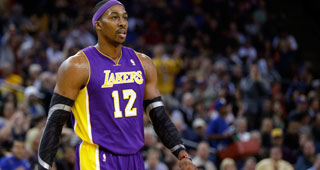Unfortunately for the Golden State Warriors, the Collective Bargaining Agreement works against them in a very real way this summer. The rumors that Dwight Howard has interest in the Warriors can only be construed as incredibly encouraging in terms of the development of the franchise, but acquiring him would be very difficult to accomplish this summer.
One of the new CBA rules that goes into effect this summer limits teams who are paying the luxury tax. In short, there is a salary level above the luxury tax called the apron ($4 million in salary above the luxury tax line) and teams over that line cannot do transactions like signing a player to the full mid-level exception, using the Bi-Annual exception, and starting this year they cannot acquire players via sign-and-trade. That limitation means that a team cannot sign a player and immediately trade them to a team over the apron, not the other way around. On top of that, doing any of these three things turns what usually functions as a soft cap that franchises can go over for times into a hard one, meaning that teams using these transactions absolutely cannot go over the apron for any period of time for any reason that season.
While we do not know exactly where the luxury tax line will be for 2013-14, it stood at $70.307 million last season so the apron was $74.307 million.
At the present moment, if Brandon Rush takes his player option and Carl Landry declines his, the Warriors sit at $71,680,588 with 13 players on the books (Curry, Lee, Bogut, Thompson, Barnes, Green, Ezeli, Rush, Jefferson, Biedrins, Bazemore, Jones and Machado). Even without any money allotted for Jarrett Jack and Carl Landry, the team would have approximately $2.6 million under the apron with a small amount of wiggle room depending on guarantees to the minimum guys. If they acquired Howard via sign-and-trade, the apron number would become a hard cap, so they would effectively need to either shed 2013-14 salary in the sign-and-trade, or fill out the roster with bare bones players.
On top of all that, the Lakers would have to agree to send Dwight to a division rival, which may be dicey in and of itself, but would also require the Warriors to give up some players of value. While the Lakers would ask for Stephen Curry, a deal using either Klay Thompson or Harrison Barnes would likely still be palatable enough to make a trade possible. To balance the salaries Bob Myers would likely have to give up either Andrew Bogut or David Lee (almost definitely Bogut) since Biedrins and Jefferson provide no value beyond their expiring contracts. My best guess at a trade the Lakers would accept is Thompson or Barnes, Bogut, and either Draymond Green or Festus Ezeli for Howard.
Dwight’s maximum salary for 2013-14 stands at $20,513,178 since that is a five percent increase on his current salary. As such, the deal I laid out above (Klay, Bogut, and Festus for Dwight, let’s say) would actually cost the Warriors an extra $3.13 million and put them over the apron without corresponding moves.
Getting Dwight this summer sits within the realm of possibility but it would come at a steep, steep cost unless the Lakers are more generous than expected.
The other factor looming over this whole situation has to be the way the Warriors chose to load up their 2013-14 cap figure. By using the amnesty provision on Charlie Bell’s expiring contract back in 2011, the Golden State front office lost the ability to shed either Andris Biedrins or David Lee’s contract at any point over the next few seasons. Using the amnesty on either would have given the Warriors the flexibility to make a move for Dwight Howard right now without the apron coming into play.
What makes matters even more challenging this summer was the decision to effectively purchase the 2012 draft pick used to select Festus Ezeli for Richard Jefferson’s $11 million contract for 2013-14. Steven Jackson’s deal expires this summer and thus would have become cap space at this point. Switching that move or the amnesty decision would have given the Warriors enough space under the apron to acquire Dwight and retain either Jack or Landry with a little bit left over.
While it would make dramatically more sense to acquire a high-level free agent next summer when the team has cap space, the Warriors conceptually could trade for Dwight Howard this summer even though key decisions made over the last few years created a substantially more difficult path to doing so.



